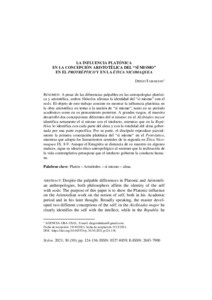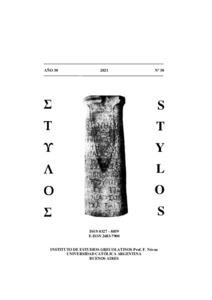Por favor, use este identificador para citar o enlazar este ítem:
https://repositorio.uca.edu.ar/handle/123456789/13365| Título: | La influencia platónica en la concepción aristotélica del “sí mismo” en el Protréptico y en la Ética nicomaquea | Autor: | Tabakian, Diego | Palabras clave: | LITERATURA COMPARADA; FILOSOFOS; LITERATURA GRIEGA; Aristóteles, 384-322 a.C.; Platón, 427-347 a. C.; Protréptico; Etica nicomaquea; ETICA | Fecha de publicación: | 2021 | Editorial: | Pontificia Universidad Católica Argentina. Facultad de Filosofía y Letras. Instituto de estudios grecolatinos "Prof. F. Nóvoa" | Cita: | Tabakian, D. La influencia platónica en la concepción aristotélica del “sí mismo” en el Protréptico y en la Ética nicomaquea [en línea]. Stylos. 2021, 30. doi: 10.46553/sty.30.30.2021.p124-136. Disponible en: https://repositorio.uca.edu.ar/handle/123456789/13365 | Resumen: | Resumen: A pesar de las diferencias palpables en las antropologías platónica
y aristotélica, ambos filósofos afirman la identidad del “sí mismo” con el noûs. El objeto de este trabajo consiste en mostrar la influencia platónica en la obra aristotélica en torno a la noción de “sí mismo”, tanto en su período
académico como en su pensamiento posterior. A grandes rasgos, el maestro desarrolló dos concepciones diferentes del sí mismo: en el Alcibíades mayor
identifica netamente el sí mismo con el intelecto, mientras que en la Repú-
blica lo identifica con cada parte del alma y con la totalidad del alma gober-
nada por una parte específica. Por su parte, el discípulo reproduce parcial-
mente la primera concepción platónica del “sí mismo” en el Protréptico,
mientras que adopta los lineamientos centrales de la segunda en Ética Nicomaquea
IX. 8-9. Aunque el Estagirita se distancia de su maestro en algunos
matices, sigue su ideario ético-antropológico al sostener que la realización de
la vida contemplativa presupone que el intelecto gobierne la conducta humana. Abstract: Despite the palpable differences in Platonic and Aristotelian anthropologies, both philosophers affirm the identity of the self with noûs. The purpose of this paper is to show the Platonic influence on the Aristotelian work on the notion of self, both in his Academic period and in his later thought. Broadly speaking, the master developed two different conceptions of the self: in the Alcibiades major he clearly identifies the self with the intellect, while in the Republic he identifies it with each part of the soul and with the totality of the soul governed by a specific part. The disciple partially reproduces the first Platonic conception of the "self" in the Protrepticus, while he adopts the central lines of the second in Nicomachean Ethics IX. 8-9. Although the Stagirite distances himself from his master in some nuanc- es, he follows the Platonic ethical-anthropological ideal in maintaining that the realization of the contemplative life presupposes that the intel- lect governs human behavior. |
URI: | https://repositorio.uca.edu.ar/handle/123456789/13365 | ISSN: | 0327-8859 (impreso) 2683-7900 (online) |
Disciplina: | LITERATURA | DOI: | 10.46553/sty.30.30.2021.p124-136 | Derechos: | Acceso abierto | Fuente: | Stylos. 2021, 30 |
| Aparece en las colecciones: | STY - 2021 nro. 30 |
Ficheros en este ítem:
| Fichero | Descripción | Tamaño | Formato | |
|---|---|---|---|---|
| influencia-platónica-concepción.pdf | 354,63 kB | Adobe PDF |  Visualizar/Abrir | |
| stylos30_portada.pdf | 128,89 kB | Adobe PDF |  Visualizar/Abrir |
Visualizaciones de página(s)
93
comprobado en 27-abr-2024
Descarga(s)
82
comprobado en 27-abr-2024
Google ScholarTM
Ver en Google Scholar
Altmetric
Altmetric
Este ítem está sujeto a una Licencia Creative Commons

